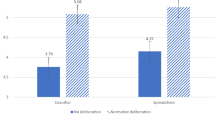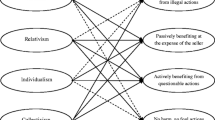Abstract
Finance is an area that, in practice, is plagued by accusations of unethical activity; the study of finance had adopted a largely nonbehavioral approach to business ethics research. We address this gap in by assessing whether individual ethical orientations (moral identity, idealism, relativism, integrity, Machiavellianism) predict the acceptability of questionable decisions about financial issues. Results show that individual ethical orientations are associated with different levels of acceptability of questionable decisions about financial issues, though the pattern of these differences varies across individual ethical orientations assessed. These results represent evidence that ethical individual differences are associated with the acceptability of questionable finance decisions and are discussed in terms of methodological limitations and future directions in finance ethics research.
Similar content being viewed by others
Notes
The idealism scale correlates .92 with the original subscale; the relativism scale correlates .89 with the original subscale.
References
Ameen, E. C., Guffey, D. M., & McMillan, J. J. (1996). Gender differences in determining the ethical sensitivity of future accounting professionals. Journal of Business Ethics, 15(5), 591–597.
Aquino, K., & Reed, A. I. I. (2002). The self-importance of moral identity. Journal of Personality and Social Psychology, 83, 1423–1440.
Barry, C. M., Sackett, P. S., & Wiemann, S. (2007). A review of recent developments in integrity test research. Personnel Psychology, 60, 271–301.
Bartholomew, C. S., & Gustafson, S. B. (1998). Perceived leader integrity scale: An instrument for assessing employee perceptions of leader integrity. Leadership Quarterly, 9, 127–146.
Boal, K. B., & Peery, N. (1985). The cognitive structure of corporate social responsibility. Journal of Management, 11, 71–82.
Calomiris, C. W. (2008). The subprime turmoil: What’s old, what’s new, and what’s next? American Enterprise Institute for Public Policy Research. http://www.aei.org/paper/28720.
Christie, R., & Geis, F. (1970). Studies in Machiavellianism. New York: Academic Press.
Dahling, J. J., Whitaker, B. G., & Levy, P. E. (2009). The development and validation of a new Machiavellianism scale. Journal of Management, 35(2), 219–257.
Davis, M. A., Andersen, M. G., & Curtis, M. B. (2001). Measuring ethical ideology in business ethics: A critical analysis of the Ethics Position Questionnaire. Journal of Business Ethics, 32, 35–53.
Den Hartog, D., & Belschak, F. (2012). Work engagement and Machiavellianism in the ethical leadership process. Journal of Business Ethics, 107(1), 35–47.
Elm, D., & Nichols, M. L. (1993). An investigation of the moral reasoning of managers. Journal of Business Ethics, 12, 817–833.
Fehr, B., Samson, D., & Paulhus, D. L. (1992). The construct of Machiavellianism: Twenty years later. In C. Spielberger & J. Butcher (Eds.), Advances in personality assessment (Vol. 9, pp. 77–116). Hillsdale, NJ: Lawrence Erlbaum.
Forsyth, D. R. (1980). A taxonomy of ethical ideologies. Journal of Personality and Social Psychology, 39, 175–184.
Forsyth, D. R. (1981). Moral judgment: The influence of ethical ideology. Personality and Social Psychology Bulletin, 7, 218–223.
Forsyth, D. R. (1992). Judging the morality of business practices: The influence of personal moral philosophies. Journal of Business Ethics, 11, 461–470.
Forsyth, D. K., Nye, J. L., & Kelley, K. (1988). Idealism, relativism, and the ethic of caring. Journal of Psychology, 122, 243–248.
Forsyth, D. R., & Pope, W. R. (1984). Ethical ideology and judgments of social psychological research: A multidimensional analysis. Journal of Personality and Social Psychology, 46, 1365–1375.
Gilligan, C. (1982). In a different voice: Psychological theory and women’s development. Cambridge, MA: Harvard University Press.
Greenberg, J. (2002). Who stole the money, and when? Individual and situational determinants of employee theft. Organizational Behavior and Human Decision Processes, 89(1), 985–1003.
Harrell, W. A., & Hartnagel, T. (1976). The impact of Machiavellianism and the trustfulness of the victim on laboratory theft. Sociometry, 39, 157–165.
Heineman, B. W, Jr. (2007). Avoiding integrity land mines. Harvard Business Review, 85, 100–108.
Henle, C. A., Giacalone, R. A., & Jurkiewicz, C. L. (2005). The role of ethical ideology in employee deviance. Journal of Business Ethics, 56, 219–230.
Hunt, S. D., & Chonko, L. B. (1984). Marketing and machiavellianism. The Journal of Marketing, 48, 30–42.
Johnson, R. M., & Schlenker, B. R. (2007). Assessing the commitment to ethical principles: Psychometric properties of the Integrity Scale. Unpublished manuscript, University of Florida.
Jones, T. M. (1991). Ethical decision making by individuals in organizations: An issue-contingent model. Academy of Management Review, 16, 366–395.
Jones, T. M., & Ryan, L. V. (1997). The link between ethical judgment and action in organizations: A moral approbation approach. Organization Science, 8, 663–680.
Judge, T. A., Ilies, R., & Scott, B. A. (2006). Work-family conflict and emotions: Effects at work and at home. Personnel Psychology, 59, 779–814.
Kane, E. J. (2012). Missing elements in US financial reform: A Kübler-Ross interpretation of the inadequacy of the Dodd-Frank Act. Journal of Banking & Finance, 36(3), 654–661.
Kohlberg, L. (1958). The development of modes of thinking and choices in years 10 to 16. Ph. D. Dissertation, University of Chicago.
Kohlberg, L. (1984). The psychology of moral development: The nature and validity of moral stages. In Essays on moral development (Vol. 2). New York: Harper & Row.
Machiavelli, N. (1981). The prince. New York: Bantam Books. (Original work published 1513).
Machiavelli, N. (1984). The discourses. New York: Penguin. (Original work published 1531).
Mayer, D. M., Aquino, K., Greenbaum, R. L., & Kuenzi, M. (2012). Who displays ethical leadership and why does it matter? An examination of antecedents and consequences of ethical leadership. Academy of Management Journal, 55, 151–171.
Mian, A., & Sufi, A. (2008). The consequences of mortgage credit expansion: Evidence from the 2007 mortgage default crisis. NBER Working Paper No. 13936.
Miller, M. L., & Schlenker, B. R. (2007). Integrity and identity: Triangulating private and public perceptions of moral identity. Unpublished manuscript, University of Florida.
Mount, M., Ilies, R., & Johnson, E. (2006). Relationship of personality traits and counterproductive work behaviors: The mediating effects of job satisfaction. Personnel Psychology, 59, 591–622.
Mudrack, P. (2007). Individual personality factors that affect normative beliefs about the rightness of corporate social responsibility. Business and Society, 6, 33–62.
Nunnally, J. C. (1978). Psychometric theory. New York: McGraw-Hill.
Pearson, C. M., Andersson, L. M., & Wegner, J. W. (2001). When workers flout convention: A study of workplace incivility. Human Relations, 54(11), 1387–1419.
Piccolo, R. F., & Colquitt, J. A. (2006). Transformational leadership and job behaviors: The mediating role of job characteristics. Academy of Management Journal, 49, 327–340.
Ponemon, L. (1990). Ethical judgments in accounting: A cognitive-developmental perspective. Critical Perspectives on Accounting, 1, 191–215.
Posner, R. A. (2009). A failure of capitalism. The crisis of ‘08 and the descent into depression. Cambridge, MA: Harvard University Press.
Reibstein, D. J., Day, G., & Wind, J. (2009). Guest editorial: Is marketing academia losing its way? Journal of Marketing, 73(4), 1–3.
Rest, J. R. (1979). Development in judging moral issues. Minneapolis: University of Minnesota Press.
Rosenfeld, P., Giacalone, R. A., & Riordan, C. (2002). Impression management: Building and enhancing reputations at work. London: Thompson Learning.
Rubin, Z., & Peplau, L. A. (1975). Who believes in a just world? Journal of Social Issues, 31, 65–90.
Sakalaki, M., Richardson, C., & Thepaut, Y. (2007). Machiavellianism and economic opportunism. Journal of Applied Social Psychology, 37, 1181–1190.
Schlenker, B. R. (2008). Integrity and character: Implications of principled and expedient ethical ideologies. Journal of Social and Clinical Psychology, 27, 1078–1125.
Schlenker, B. R., & Forsyth, D. R. (1977). On the ethics of psychological research. Journal of Experimental Social Psychology, 13, 369–396.
Schlenker, B. R., Weigold, M. F., & Schlenker, K. A. (2008). What makes a hero? The impact of integrity on admiration and interpersonal judgment. Journal of Personality, 76, 323–355.
Schwepker, C. H, Jr, & Hartline, M. (2005). Managing the ethical climate of customer-contact service employees. Journal of Service Research, 7, 377–397.
Singhapakdi, A., Vitell, S. J., Rallapalli, K. C., & Kraft, K. L. (1996). The perceived role of ethics and social responsibility: A scale development. Journal of Business Ethics, 15, 1131–1140.
Skreta, V., & Veldkamp, L. (2009). Ratings shopping and asset complexity: A theory of ratings inflation. NBER Working Paper No. 14761.
Sparks, J. R. (1994). Machiavellianism and personal success in marketing: The moderating role of latitude for improvisation. Journal of the Academy of Marketing Science, 22(4), 393–400.
Stylianou, A., Winter, S., Niu, Y., Giacalone, R. A., & Campbell, M. (2012). Understanding behavioral intention to report unethical information technology practices: The role of Machiavellianism, gender and computer literacy. Journal of Business Ethics, 117(2), 333–343.
Tenbrunsel, A. E., & Messick, D. M. (2004). Ethical fading: The role of self deception in unethical behavior. Social Justice Research, 17(2), 223–236.
Tenbrunsel, A. E., & Smith-Crowe, K. (2008). Ethical decision making: Where we’ve been and where we’re going. Academy of Management Annals, 2, 545–607.
Tepper, B. J. (2000). Consequences of abusive supervision. Academy of Management Journal, 43(2), 178–190.
Weber, J. (1988). The relationship between managerial value orientations and stages of moral development: Theory development and empirical investigation with behavioral implications. Doctoral Dissertation, University of Pittsburgh.
Winter, S., Stylianou, A., & Giacalone, R. (2004). Individual orientations in the acceptability of unethical information technology practices: The case of Machiavellianism and ethical ideology. Journal of Business Ethics, 54(3), 279–301.
Winterich, K. P., Aquino, K., Mittal, V., & Swartz, R. (2013). When moral identity symbolization motivates prosocial behavior: The role of recognition and moral identity internalization. Journal of Applied Psychology, 98(5), 759–770.
Author information
Authors and Affiliations
Corresponding author
Additional information
The order of the final two authors was equal and listed in alphabetical order.
Rights and permissions
About this article
Cite this article
Clouse, M., Giacalone, R.A., Olsen, T.D. et al. Individual Ethical Orientations and the Perceived Acceptability of Questionable Finance Ethics Decisions. J Bus Ethics 144, 549–558 (2017). https://doi.org/10.1007/s10551-015-2798-7
Received:
Accepted:
Published:
Issue Date:
DOI: https://doi.org/10.1007/s10551-015-2798-7




